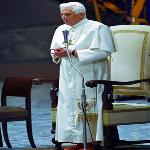17 January 2010

Photo: AP
Pope Benedict XVI delivers address to the faithful, during the weekly general audience in the Paul VI hall at The Vatican (File)
Pope Benedict's planned visit to Rome's main Jewish synagogue on Sunday has sharply divided Jews. Some have been angered by his efforts to push World War II Pope Pius XII toward sainthood.
Pope Benedict has visited Jewish synagogues before, but never the one in Rome. His predecessor, Pope John Paul II, became the first pontiff to set foot in a synagogue when he visited the one in Rome in 1986.
A number of Jewish leaders from around the world have traveled to the Italian capital for the German-born Pope's third visit to a Jewish house of worship. He has already visited the Jewish synagogues in Cologne, Germany, and New York.
But some Jewish rabbis and Holocaust survivors have decided to boycott this visit. They are upset that the pope recently praised the heroic virtues of wartime Pope Pius XII, moving him a step closer to sainthood. Many Jews believe Pope Pius turned a blind eye to the persecution of Jews during the second world war.
The Vatican maintains that Pope Pius worked quietly behind the scenes because direct interventions might have worsened the situation for both Jews and Catholics in Europe.
Pope Benedict will pause in front of a plaque at the synagague honoring the more than one thousand Roman Jews deported by the Nazis to concentration camps. He will be greeted by the chief rabbi of Rome, Riccardo Di Segni.
Some Holocaust survivors and their families have asked the Rome Rabbi to convey to the Pope their displeasure for his efforts to elevate Pius to sainthood.
However, some Roman citizens think Pope Benedict's visit to the synagogue is the right thing to do.
One man says it is another sign that Pope Benedict is trying to foster unity with all the other religions.
Some Jews are also upset at the Pope's decision last year to start the rehabilitation process of a traditionalist British bishop who denied the extent of the holocaust. But despite these setbacks, efforts at furthering dialogue between the two religions are set to continue.